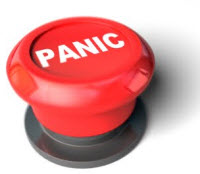There’s nothing new to report about anxiety itself. That’s because it’s a normal human response; some of us experience it intermittently, other chronically. Most of the attention in this class of disorders is on PTSD and OCD.
 PTSD has aroused debate especially surrounding the definition of the traumatic event that anchors the symptoms. It is not controversial that intense traumatic events qualify as criterion, but what about purely psychosocial events without physical injury? DSM IV does not require that someone directly experience the trauma. The traumatic event may just be witnessed or heard about via television events, etc. Suggestions are being made that PTSD criteria be tightened up such that only those directly experiencing a trauma receive the diagnosis. If this comes to fruition in DSM 5, look for fireworks.
PTSD has aroused debate especially surrounding the definition of the traumatic event that anchors the symptoms. It is not controversial that intense traumatic events qualify as criterion, but what about purely psychosocial events without physical injury? DSM IV does not require that someone directly experience the trauma. The traumatic event may just be witnessed or heard about via television events, etc. Suggestions are being made that PTSD criteria be tightened up such that only those directly experiencing a trauma receive the diagnosis. If this comes to fruition in DSM 5, look for fireworks.
Deep Brain Stimulation – the bilateral implantation of two electrodes at specific areas in the brain where they release continuous, low-voltage electrical shocks – is gaining more attention for the treatment of severe, intractable OCD.
Anti-anxiety agents:
It comes as no surprise to me that no new releases occurred in this drug category during 2010. The most recent approval was Edular (zolpidem tartrate) in the latter part of 2009. Sound familiar? Edular is simply a brand-name clone of the now generically available Ambien. It is an oral disintegrating preparation, which means it doesn’t have to be taken with fluids. One gets to pay about $150 for this little perk.
Benzodiazepines remain in widespread use for managing adjustment disorders with anxious mood. Prescriber decisions as to which benzodiazepine to use are typically based on the anxiety disorder being treated, as well as on the onset of action and the duration of action of the benzodiazepine. For example, in the treatment of generalized anxiety disorder, a long half-life benzodiazepine such as Klonopin is often employed, due to its long duration of action. At low dosage ranges, benzodiazepines alleviate anxiety. At increasingly higher doses, they have skeletal muscle relaxation properties, act as anticonvulsants and promote sleep.
Absolutely none of the anxiolytic sleep agents (Ambien, Sonata, Lunesta, Edular) consistently keep people asleep. Television advertisements continue to be misleading.





Leave A Comment
You must be logged in to post a comment.